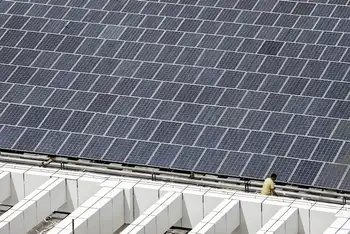Power line hearing draws ample opposition
PENNSYLVANIA - If one day's show of opposition can influence the outcome of public hearings on Allegheny Energy Inc.'s proposed $1.2 billion high-voltage transmission line across Southwestern Pennsylvania and two other states, the project could be in bad shape.
Critics of the 240-mile Trans-Allegheny Interstate Line made their presence known inside and outside Downtown's State Office Building during the start of three weeks of Public Utility Commission hearings that will feature highly technical, expert witness testimony.
More than 60 opponents sat in the hearing room or carried signs and placards outside the building. Keith Neill, who with his brother Curtis owns 100 acres in North Strabane, Washington County, said his property value will be damaged should the power line be built.
"We've attended the public hearings, my brother has had discussions with the Allegheny Energy people, but they weren't fruitful," said Neill, dressed in a black T-shirt with bold yellow letters spelling "Stop the Towers".
"I expect to split time at the hearings with my brother," Neill said.
Public Utility Commission Administrative Law Judges Michael A. Nemec and Mark Hoyer oversee the hearings. They will make recommendations to the PUC, which will decide whether to approve the power line plan. The Trans-Allegheny project includes a primary 500-kilovolt line stretching from near Eighty Four, Washington County, into West Virginia, then east to Loudoun County, Va., about 35 miles west of Washington.
Three, smaller 138-kilovolt lines are proposed within the Pennsylvania portion of the project. Allegheny Energy's share of the bill is about $850 million. The Greensburg-based energy company contends that all but 1.2 miles of the project in Pennsylvania address local reliability needs.
"This evidentiary hearing will give us the opportunity to demonstrate the careful evaluation undertaken to address reliability issues," said David E. Flitman, president of Allegheny Energy's power transmission-distribution unit, in a statement. Opponents of the project object on health and aesthetic grounds, along with potential lower property values should a line cross or a transmission tower sit on their property.
Another reason in-state opponents are against the Trans-Allegheny line is they don't see a need for a large power line. Pepper Hamilton LLP attorney Willard Burns pressed the need issue during cross-examination of Allegheny Energy witness Steven Herling, a planning vice president for PJM Interconnection of Valley Forge.
PJM coordinates and operates the power transmission grid in all or parts of 13 states, including Pennsylvania and the District of Columbia - an area serviced by 17 power companies and with a population of 51 million.
"We want to focus on the need for the 500 kV line. The basis of Allegheny's assumptions is the alleged fear of blackouts if the line isn't built - and that's ridiculous, said Burns, who represents the Conservation Council of Pennsylvania at the hearing. "Everyone loses power every now and then. The blackout talk just is a smokescreen."
Related News

Power customers in British Columbia, Quebec have faced fees for refusing the installation of smart meters
SAINT JOHN - NB Power customers who do not want a smart meter installed on their home could be facing a stiff fee for that decision, but so far the utility is not saying how much it might be.
"It will be based on the principles of cost causation, but we have not gotten into the detail of what that fee would be at this point," said NB Power Senior Vice President of Operations Lori Clark at Energy and Utilities Board hearings on Friday.
In other jurisdictions that have already adopted smart meters, customers not wanting to participate have faced hundreds…




